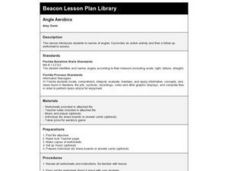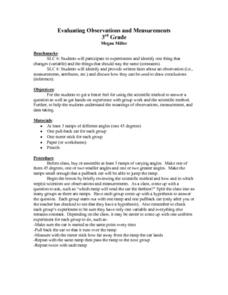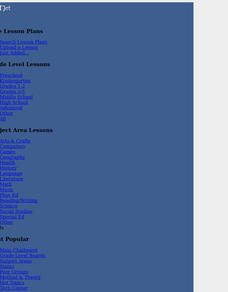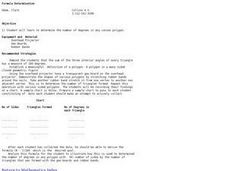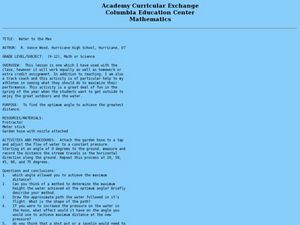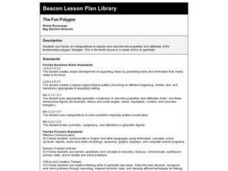Curated OER
Gravity, Angles, and Measurement
Students relate math to real life scenarios. In this geometry lesson, students launch a ball tracking each launch using a graph. They analyze their data for speed, angles and distance, trying to improve on each launch.
Curated OER
Triangle Classificaition with Geometer's Sketchpad.
Students use Geometer's Sketchpad to draw triangles and explore the classificaiton of each using the mearsures of interior angles and the lengths of the sides.
EngageNY
Extending the Domain of Sine and Cosine to All Real Numbers
Round and round we go! Pupils use reference angles to evaluate common sine and cosine values of angles greater than 360 degrees. Once they have mastered the reference angle, learners repeat the process with negative angles.
Curated OER
Rocket Angles
Eighth graders create rockets that be launched at varying angles to determine which angle is best to launch at for the longest distance.
Curated OER
Angles: Angles, Angles, Everywhere
Students estimate and accurately measure the size of angles communicate with the appropriate geometric terms and symbols to describe and name angles, lines, line segments, rays
Curated OER
Reflection of Light With Two Plane Mirrors- Double Mirrors Placed at a Number of Angles
Students place two plane mirrors at different angles to experiment with reflection. They make kaleidoscopes and periscopes.
Curated OER
Angle Benchmarks
Sixth graders discuss the characteristics of specific angles and then use the information to to identify and estimate given angles. The class goes outside, identifies north, and turns a specified amount of degrees. Using a given compass,...
Curated OER
Angle Aerobics
Third graders review angle criteria and then stand. They demonstrate with their hands each type of angle called out by the teacher: right, acute, or obtuse. Music is added and students follow teacher in an angle aerobics class peppered...
Curated OER
Evaluating Observations and Measurements
Third graders review the scientific method and how and in which steps scientists use observations and measurements. Then as a class, they hypothesize which ramp will send the car the farthest. They break into groups and send cars down a...
Curated OER
Estimating Angles
Sixth graders estimate the measurement of angles and linear distance from one point to another. Using a specified website, 6th graders play a game of "Golf" where they enter the angle and distance a ball must be hit. Upon completion of...
Curated OER
How To Use A Protractor
Fifth graders use the SMART Board to demonstrate how to use a protractor to measure acute, obtuse, and right angles. In this protractor lesson plan, 5th graders also complete an angles worksheet.
Curated OER
Clockwise
Second graders investigate angles through this series of lessons. They determine how angles turn in both clockwise and anticlockwise directions. They examine the characteristics of quarter half turns and how they can begin from any...
Curated OER
Lesson Exchange: Polygons (Middle, Mathematics)
Pupils discover the relationship between the sides of a polygon and the number of diagonals that can be drawn from one vertex, the number of triangles that those diagonals form, and the sum of the interior angles of that polygon.
Curated OER
Formula Determination
Learners derive a formula for the interior degrees in any convex polygon. In this geometric figure lesson, students determine the shapes of various polygons and the number of triangles formed. They use this information to derive the...
Curated OER
Sextant Measurements
Students create a sextant. Using their sextant, students measure the height of tall objects. Students explore how sailors used sextants to identify their location on the ocean. They research how sextants are created.
Curated OER
Water to the Max
Students experiment with the angle that yields the greatest distance of water at constant pressure. In this experiment with the angle that yields the greatest distance of water at constant pressure instructional activity, students...
Curated OER
Biography of a Star: Our Sun's Birth, Life, and Death
Students examine how astronomers use parallax to determine the distances of stars in the Sun's neighborhood. They construct a pinhole protractor, and measure angles and calculate distances.
Curated OER
Worksheet 13 - Implicit Differentiation
In this implicit differentiation worksheet, students differentiate expressions and identify the derivative of a function. This one-page worksheet contains six multi-step problems.
Illustrative Mathematics
Regular Tessellations of the Plane
Bringing together the young artists and the young organizers in your class, this instructional activity takes that popular topic of tessellations and gives it algebraic roots. After covering a few basic properties and definitions,...
Curated OER
When a Ruler is Too Short
Young scholars measure distances using parallax. In this math lesson, students explain how this method helped astronomers with their studies of the solar system. They determine the length of their arm using parallax and compare it with...
Beacon Learning Center
The Fun Polygon
Junior geometers use hands-on manipulatives to explore and describe the properties and attributes of a fundamental polygon, the triangle. They learn different kinds of angles and their measurements. This well-written lesson plan provides...
Curated OER
Weather Dot Com
Students examine the need for a standard unit of temperature and measure temperature with a thermometer. They discuss the details of a thermometer and the calibrations used, record temperature data for inside and outside, explore...
EngageNY
Definition of Rotation and Basic Properties
Examine the process of rotating images to visualize effects of changes to them. The fifth lesson of 18 prompts pupils to rotate different images to various degrees of rotation. It pays special attention to rotations in multiples of 90...
Curated OER
Why Does ASA Work?
Your geometry learners explore Angle-Side-Angle congruence in this collaborative task. The sum of the interior angles of all triangles being one hundred eighty degrees, is the key learners will discover as they explain their reasoning...







